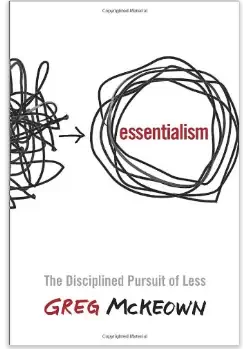It’s not hard to know what’s essential when your husband’s just had emergency surgery.
I pared my activities way back this week so I could:
- Spend time with husband Steve in the skilled nursing facility where he’s recovering from last week’s accident.
- Feed and water the animals.
- Deliver a long-awaited conference presentation on Strategic Storytelling.
- Keep the key house affairs going.
- Console the cat (who misses his main man).
But I did not:
- Try to clean the whole house before my sister-in-law flies in from Boston.
- Work on long overdue podcast episodes.
- Make the garden presentable.
- Attend the monthly Garden Club meeting
- Go out to dinner with friends.
I didn’t feel guilty. Life wasn’t about business as usual.
But now that life is settling into a new normal, choices are coming back. And once again, deciding what’s essential is hard.
I can create a list of priorities and make a to-do list. But, while useful, this only takes me so far.
Because I still have to choose what to do in the moment, a hundred times a day.
The lists I created this morning may not tell me what to do this afternoon.
Last Saturday afternoon, I decided that what I really needed to do was sit on the couch and do nothing. Vegging out had not been on my priority list.
Body and soul agreed that I needed to chill.
Choosing what is essential to do is like shooting at an ever-moving target. Principles or priorities can give me a reference point. But I still need to figure out what’s the most important thing to get done right now.
There’s been a raft of books out recently with advice about how to pare back and choose what is essential. Apparently, there’s a growing audience among those of us who are feeling stretched beyond our capacity to get even critical things done.
As Oliver Burkeman wrote recently in The Guardian:
“Most time management advice rests on the unspoken assumption that it’s possible to win the game: to find a slot for everything that matters. But if the game’s designed to be unwinnable, you can permit yourself to stop trying.”
The possible solution – looking for what you really care about and letting go of the rest.
Greg McKeown, author of the best seller Essentialism: The Disciplined Pursuit of Less, echoes this idea from a business perspective arguing that highly effective people, whether CEO’s or homemakers, know the art of focusing resolutely on what is essential and letting go of the rest.
In Essentialism, he’s addressing the chronically overwhelmed (yours truly) who have too many directions to choose from, continue to accrete goods and activities, place high expectations on themselves, are sensitive to other people’s priorities, and hope to do more than they possibly can in a 24 hour day.
Here are some suggestions he offers:
- Instead of gradually paring away a few activities (or things from your closet) use a more extreme criteria. Not “Shall I keep this?” but “Do I Love it?”
- Give yourself permission to eliminate all but the essential.
- Beware of how easy it is to stick with things and activities because we are used to having them in our lives.
“We shouldn’t ask, ‘How much do I value this opportunity?’ but ‘If I did not have this opportunity, how much would I be willing to sacrifice in order to obtain it?’”
- Other McKeown suggestions:
- Reduce your focus to a minimum of things. You only have so much time a day and to fulfill your essential purpose you should be consumed by that purpose.
- Focus on one thing at a time – which means don’t attempt to multi-focus.
- Develop the art of saying ‘no’ and feeling okay with it. Learn to enjoy it and be particular about what you say yes to. Do it consciously.
- The planning fallacy (things take longer than you expect) —remember there’s real science on why you have to do less.
- Ask yourself, “If I had a week left to live would I value this?”
- Use a scale to measure the value and effectiveness of anything you do – Where does it land on a 10pt scale and only do the 8-10s.
- Discern more and do less – Focus on the value and get the real results.
- Don’t misinterpret pressure for purpose.
- Don’t mistake effort with output.
- Don’t comment. Join fewer calls. Attend fewer meetings.
- Don’t confuse activity with progress.
- New is hardly ever better or more valuable – Don’t spend effort on everything that pops up.
- Stay on the primary contributions and real results.* (above list from coachcasebook.)
His approach goes way beyond time management.
It requires:“Not just getting rid of the obvious time wasters, but being willing to cut out really terrific opportunities as well.”
Ouch!
That’s where it hurts!
He’s really on to something – but I’m still left with a few questions:
1) Would his approach have told me whether to veg out on the couch on Saturday?
Essentialism needs to be combined with a kind of mindfulness, a way of paying attention not just to our priorities but what needs to happen in any given moment.
2) If we all were to eliminate everything but the essential, would we lose some of the glue that holds our communities together?
Think of the thousands of volunteers who keep our school associations, churches, and civic groups going. Not all of that work might make the cut as essential, but our communities are the beneficiaries.
As were Steve and I this week. I’ve been touched and moved by people who have offered to help us with his health crisis or who’ve gone out of their way to see him or call him.
Would those calls and visits have made the cut? I don’t know.
Essential or not, they were deeply felt and appreciated.
I’ll keep exploring ideas like essentialism as I learn to let go of expectations, belongings and projects in order to live a more sane, productive and peaceful life. (I write about what I need to learn!)
And I look forward to learning from your ideas as well!











2 Responses
Well said. I know it’s hard to give ourselves permission to just relax sometimes. We all seem to feel that we need to be doing something productive. I got over that! I read a lot once I get home from work and have my chores done. I walk on my trail and notice the changes of the seasons. Without that I wouldn’t be much good to the non-profits I help or the clients I serve. Don’t ever feel guilty for caring for yourself.
Brilliant and timely 🙂 Thank you, Sally!